This step by step diy woodworking project is about a 16×20 picnic shelter plans. I have designed this large picnic shelter so you can have a roof over the area. This picnic shelter has a nice gable roof with a 1:2 pitch and it can match the style of any backyard. This shelter has nice railings on all 4 sides for extra appeal. Take a look over the rest of our woodworking plans, if you want to get more building inspiration. Premium Plans available in the Shop.
When buying the lumber, you should select the planks with great care, making sure they are straight and without any visible flaws (cracks, knots, twists, decay). Investing in cedar or other weather resistant lumber is a good idea, as it will pay off on the long run. Use a spirit level to plumb and align the components, before inserting the galvanized screws, otherwise the project won’t have a symmetrical look. If you have all the materials and tools required for the project, you could get the job done in about a day. See all my Premium Plans HERE.
Projects made from these plans
16×20 Picnic Shelter – Free DIY Plans

Building-a-16×20-pavilion
Cut & Shopping Lists
- A – 10 pieces of 6×6 lumber – 132″ long POSTS
- B – 2 pieces of 6×6 lumber – 240″ long, 4 pieces of 6×6 lumber – 192″ long TOP PLATES
- C – 4 pieces of 6×6 lumber – 44 1/4″ long, 1 piece – 240″ long, 6 pieces – 48″ long BRACES
- 10 pieces of 6×6 lumber – 12′
- 3 pieces of 6×6 lumber – 20′
- 4 pieces of 6×6 lumber – 16′
- 5 pieces of 6×6 lumber – 8′
- 5″ screws, 8″ screws
- wood glue, stain/paint
- post hole digger
- post anchors (optional)
- beam to post connectors
- structural screws for connectors
- strong tie T
Tools
![]() Hammer, Tape measure, Framing square, Level
Hammer, Tape measure, Framing square, Level
![]() Miter saw, Drill machinery, Screwdriver, Sander
Miter saw, Drill machinery, Screwdriver, Sander
Time
Related
- PART 1: 16×20 Picnic Shelter Plans
- PART 2: 16x20 Pavilion Shelter Roof Plans
- PART 1: 16×20 Picnic Shelter Railings Plans
How to build a 16×20 picnic shelter
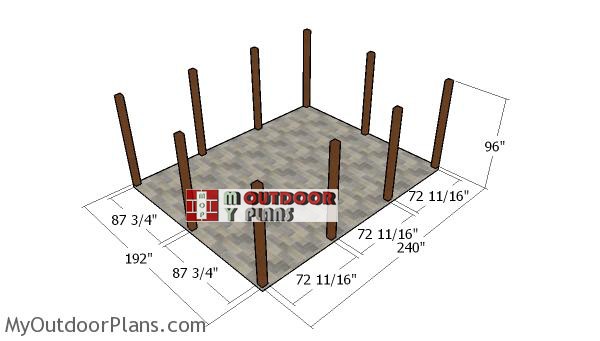
Laying-out-the-posts—16×18-pavilion
The first step of the project is to layout the posts for the 16×20 picnic shelter. Use batter boards and string to determine the location of the posts. Apply the 3-4-5 rule to every corner of the pavilion, so you make sure they are right angled. Moreover measure the diagonals and make sure they are equal. Determining the location for the pavilion is essential, as you have to comply with the local building codes. Make sure the surface is level and remove the vegetation layer.
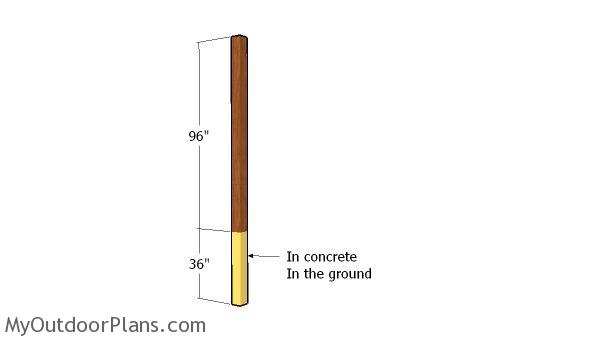
Posts
Dig 3′ deep holes into the ground with a post hole digger. Align the holes with attention and then fit form tubes. Fit the 6×6 posts with attention and align them using string. Use a spirit level to plumb the posts and then lock them into place with temporarily braces. Fill the tube forms with concrete and let it dry out for a few days. Setting the pressure treated/cedar posts in concrete is a lot better than using post anchors, as the posts will be locked in the concrete footers.

Top-rails—large-pavilion
Use 6×6 lumber for the top plates of the pavilion. Use a circular saw to make the notches to beams, as shown in the diagram. Make parallel cuts inside the marked areas and then remove the excess with a chisel. Smooth the surface with sandpaper.
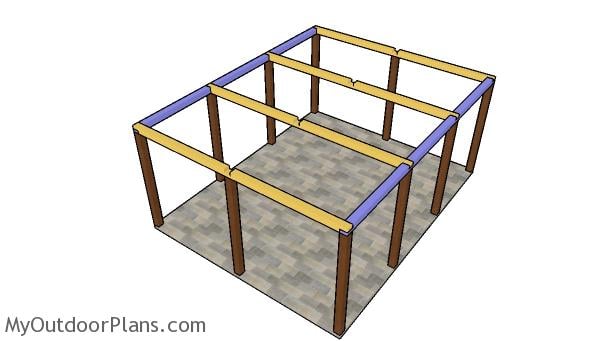
Fitting the top rails
Fit the top plates to the top of the posts. Plumb the posts with a spirit level and make sure the plates are horizontal. Check if the corners are square and align the edges with attention. Drill pilot holes through the plates and insert 8″ screws into the top of the posts.
Use 6×6 lumber for the braces, if you live in a windy area. Double check if the posts are plumb and if the corners are square. Cut both ends of the braces at 45 degrees and then secure them into place with 5″ screws, after drilling pilot holes. These braces will really enhance the rigidity of the pavilion, so make sure you don’t take shortcuts and install them properly.
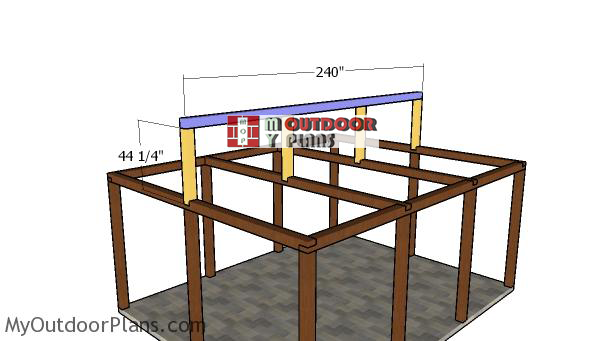
Fitting-the-ridge-beam
Use 6×6 lumber for the ridge beam supports and for the beam itself. Use a spirit level to plumb the supports and secure them into place with corner brackets. Fit the top ridge into place and use corner brackets to lock them into place, as well. Check if the corners are square and align the edges with attention. Use 8″ screws to reinforce the joists. Notice the half lap joint between the two components of the ridge beam.
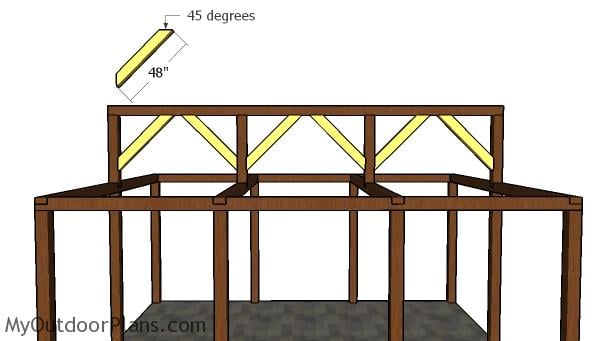
Fitting the braces
Last but not least, you need to attach the 6×6 braces to the structure of the pavilion, so you can enhance the rigidity. Cut both both ends of the braces at 45 degrees and then secure them into place tightly, with 5″ screws.
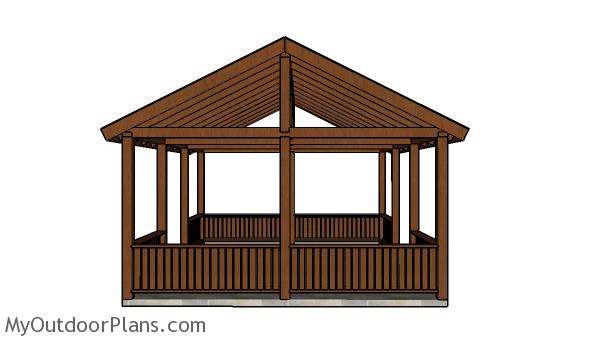
16×20 Picnic Shelter
You should check out PART 2 of the 16×20 pavilion plans, so you learn how to build the gable roof. Check PART 3 of the project, so you learn how to build the railings.
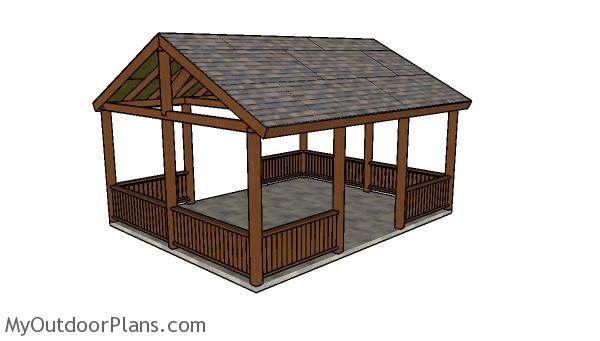
16×20 Pavilion Plans
Fill the holes with wood putty and let them dry out for a few hours. Smooth the surface with 100-220 grit sandpaper and remove the residues with a damp cloth.
Top Tip: Apply a few coats of paint or stain to the components, to enhance the look of the project. Make sure you take a look over the rest of my pergola/gazebo/pavilion plans HERE. See all my free woodworking plans (over 1000) HERE.
This woodworking project was about 16×20 outdoor pavilion plans free. If you want to see more outdoor plans, check out the rest of our step by step projects and follow the instructions to obtain a professional result. Feel free to SHARE my plans with your friends.

